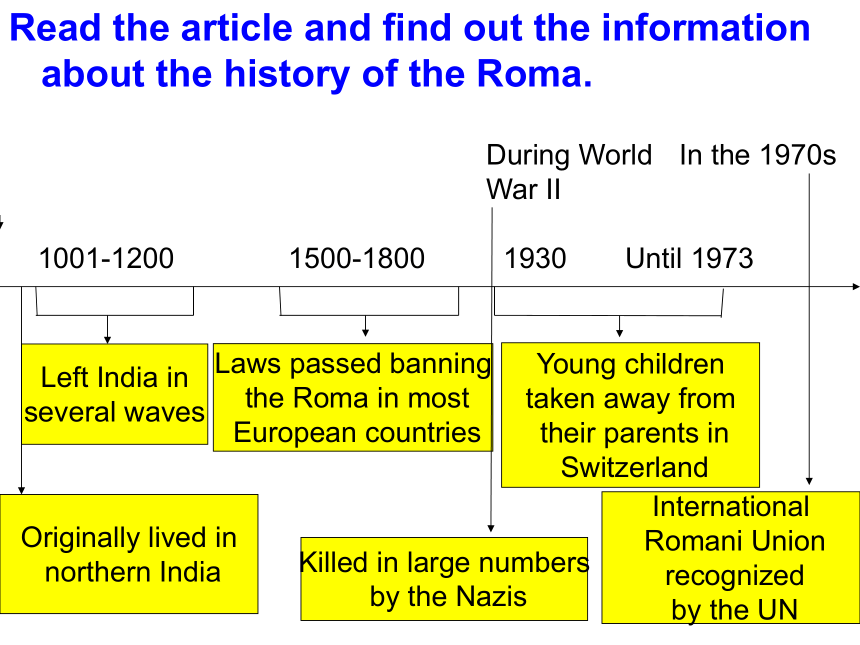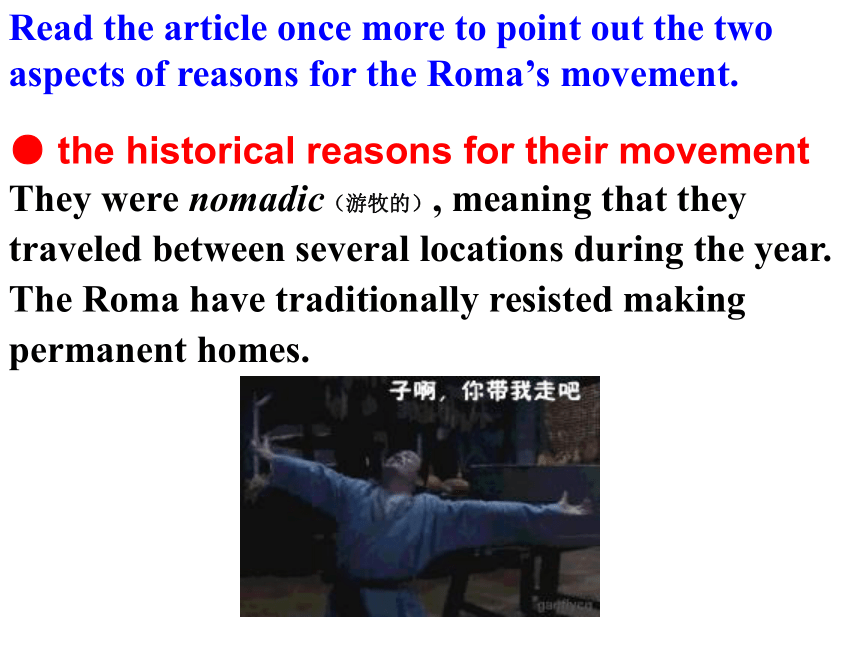unit 2 people on the move Project
文档属性
| 名称 | unit 2 people on the move Project |  | |
| 格式 | rar | ||
| 文件大小 | 1.2MB | ||
| 资源类型 | 教案 | ||
| 版本资源 | 牛津译林版 | ||
| 科目 | 英语 | ||
| 更新时间 | 2008-10-01 08:34:00 | ||
图片预览









文档简介
课件21张PPT。Project of Module10Making a classroom displayYou are welcome!Do you know that there is a group of people in the world who keep travelling from place to place? The Roma (Gypsies )Have you ever read some books or watched some films or TV programmes about these people? The Wandering RomaReading1) What does the word ‘wander’ mean and what does the title ‘the wondering Roma’ mean?
2) What do you think the article is going to tell us after reading the first paragraphs?1).The word ‘wander’ means to move about or from place to place without any purpose. From the guidelines, we can know the title refers to the group of people, the Roma(罗姆人), who keep moving from place to place.2). From the first paragraph, we can know that the article is about the history of the Roma including their society and language, and the historical and political reasons for their movement.Read the article and find out the information about the history of the Roma.Left India in
several wavesLaws passed banning
the Roma in most
European countriesYoung children
taken away from
their parents in
SwitzerlandOriginally lived in
northern India1930Until 19731500-18001001-1200In the 1970sDuring World War IIInternational
Romani Union
recognized
by the UNKilled in large numbers
by the NazisRead the article once more to point out the two aspects of reasons for the Roma’s movement. They were nomadic(游牧的), meaning that they traveled between several locations during the year.
The Roma have traditionally resisted making permanent homes.● the historical reasons for their movementThey objected to becoming citizens of one country and being forced to vote(选举) and pay taxes.
They refused to submit to(服从) any government regulations(政府法规), preferring to engage in trade and live peacefully.
They had a bad reputation in Europe as liars(说谎者) and witches(巫术), and some of the Roma pretended to be religious pilgrims(朝圣者). They have been sent away to other parts of the world because of the collision(冲突) between European culture and that of Roma.
They German Nazi(纳粹) Party plotted(密谋) to wipe the Roma out because they identified the Roma as a dangerous group. ● the political reasons for their movementDiscussion:1) What differences are identified in the article that shows the Roma are a distinct(独特的) cultural group?2) What examples are given that show European’s prejudice against the Roma throughout history?1. The article mentions that the Roma are nomadic and that they had a distinct(独特的) native language. They also prefer to live in closed(封闭的) groups and dislike making permanent homes and submitting to any government. These differences show that the Roma are a distinct cultural group.2. Many Europeans disliked the Roma’s appearance as they were often in rags(衣衫褴褛). The Roma’s traditions, such as fortune telling(算命) also caused people to think of them as witches. Some Roma also falsely claimed to be pilgrims in order to get food and many people thought the Roma were liars. PerformanceLanguage points1. This is perhaps most clearly seen in Roma’s native language, of which there are now approximately sixty different dialects. (P30) 这在罗姆人本族语言上可能最明显地表现出来,他们的语言现在大约六十种不同的方言。1). Attributive clause
Attributive: A word or word group, such as an adjective, that is placed adjacent to the noun it modifies without a linking verb; for example, pale in the pale girl. While a clause is used as an attributive, it is called attributive clause. 1. The owner of the cinema needed to make a lot of improvements and employ more people to keep it running, ___ meant spending tens of thousands of pounds. (06苏) A. who? B. that? C. as? D. whichDHave a try:2. We’re just trying to reach a point ____ both sides will sit down together and talk.( 2006山东) A. where?? B. that?? C. when?? D. which
3. Many people who had seen the film were afraid to go to the forest when they remembered the scenes _______ people were eaten by the tiger. (2005广东)
A. in which B. by which C. which D. that AA4. His movie won several awards at the film festival, ______ was beyond his wildest dream. (07 上海)
A. which B. that C. where D. itA5. Last week, only two people came to look at the house, _____ wanted to buy it. (2007 安徽)
A. none of them B. both of them
C. none of whom D. neither of whom
6. He was educated at the local high school, ______ he went on to Beijing University. (2007 江苏)
after which B. after that
C. in which D. in thatDA2. Unable to practice their traditions, many young Roma took to illegal behavior, such as stealing, and were usually the main suspects when anything went missing. (P32) 由于无法继续奉行他们的传统,许多年轻的罗姆人染上非法恶习,比如偷窃,而每当有东西丢失时 ,他们常常就是重点怀疑对象。1). take to: 喜欢,染上……习惯take 相关短语:
take after sb.
to be similar to an older member of your family in appearance or character: 和……像 He takes after his mother/his mother's side of the family.take off (FLY) phrasal verb If an aircraft, bird or insect takes off, it leaves the ground and begins to fly: 起飞、事业腾飞 The plane took off at 8.30 a.m.
take (sth.) over (GET CONTROL) phrasal verb to get control of a company by buying most of its shares (= the equal parts into which the ownership of the company is divided): 接管; The company he works for has recently been taken over.take into account (ALSO take account of) to consider or remember when judging a situation: 考虑到; I hope my teacher will take into account the fact that I was ill just before the exams when she marks my paper. I think you have to take into account that he's a good deal younger than the rest of us.
take place to happen: 发生; The concert takes place next Thursday.
take notice to give attention to something: 关注; I asked him to drive more slowly, but he didn't take any notice. 1. Don't be _____ by products promising to make you lose weight quickly. (2007 辽宁)
taken off B. taken out C. taken away D. taken inDHave a try:2. —Robert is indeed a wise man.
—Oh, yes. How often I have regretted _____ his advice! (2007 安徽)
A. to take B. taking C. not to take D. not taking
3. Don't be discouraged. _____ things as they are and you will enjoy every day of your life. (2003上海春)
A. Taking B. To take C. Take D. TakenDC
1. Read the passage in Project and try to remember something about the Roma.
2. Surf the Internet and gain more information about Roma. HomeworkThank you for coming,
See you next time!
2) What do you think the article is going to tell us after reading the first paragraphs?1).The word ‘wander’ means to move about or from place to place without any purpose. From the guidelines, we can know the title refers to the group of people, the Roma(罗姆人), who keep moving from place to place.2). From the first paragraph, we can know that the article is about the history of the Roma including their society and language, and the historical and political reasons for their movement.Read the article and find out the information about the history of the Roma.Left India in
several wavesLaws passed banning
the Roma in most
European countriesYoung children
taken away from
their parents in
SwitzerlandOriginally lived in
northern India1930Until 19731500-18001001-1200In the 1970sDuring World War IIInternational
Romani Union
recognized
by the UNKilled in large numbers
by the NazisRead the article once more to point out the two aspects of reasons for the Roma’s movement. They were nomadic(游牧的), meaning that they traveled between several locations during the year.
The Roma have traditionally resisted making permanent homes.● the historical reasons for their movementThey objected to becoming citizens of one country and being forced to vote(选举) and pay taxes.
They refused to submit to(服从) any government regulations(政府法规), preferring to engage in trade and live peacefully.
They had a bad reputation in Europe as liars(说谎者) and witches(巫术), and some of the Roma pretended to be religious pilgrims(朝圣者). They have been sent away to other parts of the world because of the collision(冲突) between European culture and that of Roma.
They German Nazi(纳粹) Party plotted(密谋) to wipe the Roma out because they identified the Roma as a dangerous group. ● the political reasons for their movementDiscussion:1) What differences are identified in the article that shows the Roma are a distinct(独特的) cultural group?2) What examples are given that show European’s prejudice against the Roma throughout history?1. The article mentions that the Roma are nomadic and that they had a distinct(独特的) native language. They also prefer to live in closed(封闭的) groups and dislike making permanent homes and submitting to any government. These differences show that the Roma are a distinct cultural group.2. Many Europeans disliked the Roma’s appearance as they were often in rags(衣衫褴褛). The Roma’s traditions, such as fortune telling(算命) also caused people to think of them as witches. Some Roma also falsely claimed to be pilgrims in order to get food and many people thought the Roma were liars. PerformanceLanguage points1. This is perhaps most clearly seen in Roma’s native language, of which there are now approximately sixty different dialects. (P30) 这在罗姆人本族语言上可能最明显地表现出来,他们的语言现在大约六十种不同的方言。1). Attributive clause
Attributive: A word or word group, such as an adjective, that is placed adjacent to the noun it modifies without a linking verb; for example, pale in the pale girl. While a clause is used as an attributive, it is called attributive clause. 1. The owner of the cinema needed to make a lot of improvements and employ more people to keep it running, ___ meant spending tens of thousands of pounds. (06苏) A. who? B. that? C. as? D. whichDHave a try:2. We’re just trying to reach a point ____ both sides will sit down together and talk.( 2006山东) A. where?? B. that?? C. when?? D. which
3. Many people who had seen the film were afraid to go to the forest when they remembered the scenes _______ people were eaten by the tiger. (2005广东)
A. in which B. by which C. which D. that AA4. His movie won several awards at the film festival, ______ was beyond his wildest dream. (07 上海)
A. which B. that C. where D. itA5. Last week, only two people came to look at the house, _____ wanted to buy it. (2007 安徽)
A. none of them B. both of them
C. none of whom D. neither of whom
6. He was educated at the local high school, ______ he went on to Beijing University. (2007 江苏)
after which B. after that
C. in which D. in thatDA2. Unable to practice their traditions, many young Roma took to illegal behavior, such as stealing, and were usually the main suspects when anything went missing. (P32) 由于无法继续奉行他们的传统,许多年轻的罗姆人染上非法恶习,比如偷窃,而每当有东西丢失时 ,他们常常就是重点怀疑对象。1). take to: 喜欢,染上……习惯take 相关短语:
take after sb.
to be similar to an older member of your family in appearance or character: 和……像 He takes after his mother/his mother's side of the family.take off (FLY) phrasal verb If an aircraft, bird or insect takes off, it leaves the ground and begins to fly: 起飞、事业腾飞 The plane took off at 8.30 a.m.
take (sth.) over (GET CONTROL) phrasal verb to get control of a company by buying most of its shares (= the equal parts into which the ownership of the company is divided): 接管; The company he works for has recently been taken over.take into account (ALSO take account of) to consider or remember when judging a situation: 考虑到; I hope my teacher will take into account the fact that I was ill just before the exams when she marks my paper. I think you have to take into account that he's a good deal younger than the rest of us.
take place to happen: 发生; The concert takes place next Thursday.
take notice to give attention to something: 关注; I asked him to drive more slowly, but he didn't take any notice. 1. Don't be _____ by products promising to make you lose weight quickly. (2007 辽宁)
taken off B. taken out C. taken away D. taken inDHave a try:2. —Robert is indeed a wise man.
—Oh, yes. How often I have regretted _____ his advice! (2007 安徽)
A. to take B. taking C. not to take D. not taking
3. Don't be discouraged. _____ things as they are and you will enjoy every day of your life. (2003上海春)
A. Taking B. To take C. Take D. TakenDC
1. Read the passage in Project and try to remember something about the Roma.
2. Surf the Internet and gain more information about Roma. HomeworkThank you for coming,
See you next time!
同课章节目录
- 模块9
- Unit 1 Other countries, other cultures
- Unit 2 Witnessing time
- Unit 3 The meaning of colou
- Unit 4 Behind beliefs
- 模块10
- unit 1 building the future
- unit 2 people on the move
- unit 3 protecting ourselves
- unit 4 law and orde
- 模块11
- unit 1 careers and skills
- unit 2 getting a job
- unit 3 the secret of success
- unit 4 the next step
